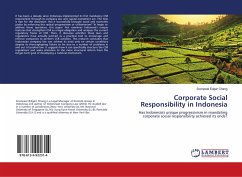It has been a decade since Indonesia implemented its first mandatory CSR requirement through its company law and capital investment act. The time is ripe for the discussion: Has it successfully brought social and economic justice by enforcing this radical progressivism or utilitarianism? To begin to address these questions, this paper first examines Indonesia's unique features that strengthen CSR as a legal obligation and analyzes the current regulatory frame of CSR. Then, it discusses whether these laws and regulations have actually worked as a practical tool to encourage and enforce companies to perform CSR activities. This research concludes that Indonesian company law can achieve its ends only on certain conditions despite its thoroughgoing failure so far due to a number of problems in and out of positive law. It suggests how it can specifically structure the CSR regulations and seeks attention to the more structural reform from the longer-term goal of developing a national mechanism.
Bitte wählen Sie Ihr Anliegen aus.
Rechnungen
Retourenschein anfordern
Bestellstatus
Storno








